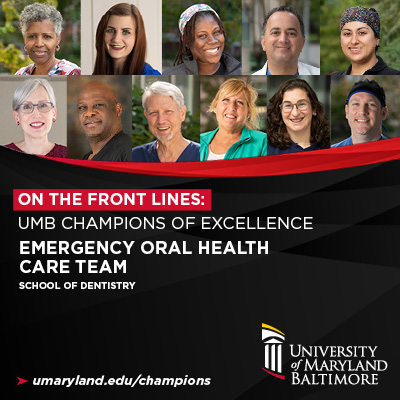On the Front Lines: UMB Champions of Excellence: School of Dentistry Emergency Oral Health Care Team
January 13, 2021 Lou Cortina
The school’s integrated oral health care clinic was swiftly and safely transformed into a site for emergency-only dental treatment at the outset of the COVID-19 pandemic.
The Champions of Excellence campaign is a multiyear branding campaign at the University of Maryland, Baltimore (UMB) in which we highlight individuals and teams that exemplify extraordinary accomplishment and represent excellence at the University. In 2020-21, UMB is highlighting the employees who've done exemplary work during the COVID-19 pandemic, and The Elm will be featuring these UMB Champions, who are making Baltimore, our region, and in some cases the world a better place.
Today: School of Dentistry Emergency Oral Health Care Team
The highly transmissible nature of COVID-19 poses a challenge for health care professionals who must treat patients while maintaining safety protocols to limit the risk of exposure. The potential for airborne transmission is high, so the challenge is even greater for clinicians who work in proximity to a patient’s mouth.
The University of Maryland School of Dentistry (UMSOD) faced this obstacle when the pandemic unfolded in March 2020 and routine oral care services were halted. A team was assembled and tasked with quickly turning the school’s integrated oral health care clinic into a site for emergency-only dental care.
“We sat down and figured: OK, this is an aerosol problem, right? This is an airborne virus,” said Robert Windsor, DDS, director of clinical operations at UMSOD. “Dentistry creates an aerosol, we have a lot of water spray, and we’re only 12 to 14 inches away from the patient. So we had to limit our procedures to true emergencies.
“The American Dental Association defined what a true dental emergency was, then we had to figure out how to treat those emergencies. So we talked about bleeding, swelling, or an actual trauma injury — those are the types of things we had to equip ourselves for and develop a process to handle.”
(Watch video below.)
Among the safety protocols, patients were screened for symptoms before entering the building and required to wear face coverings except during procedures, and dental care providers wore personal protection equipment that included gown, gloves, a fit-tested N-95 mask or equivalent, face shield, and head cover when treating patients.
Working with UMSOD’s urgent care/oral and maxillofacial surgery clinicians, the team ensured the availability of emergency treatment for patients of record, walk-ins, and referrals from regional hospitals into June. Nearly 40 patients a day were treated for conditions including uncontrolled bleeding, diffuse soft tissue bacterial infections, and trauma that could potentially compromise a patient’s airway.
Regular oral care procedures resumed in early July, and through mid-January 2021, when this article was published, not one case of COVID-19 had originated from the clinic, says Windsor, who credits UMSOD’s planning for this success.
“We had fortunately planned well in advance for this,” he said. “With the swine flu situation about 10 years ago, we had to order N-95 masks, so we had a good supply of those on hand at the school, which allowed us to open up right away for emergency treatments.”
The 11 people on the UMSOD team who executed this strategy are being honored as University of Maryland, Baltimore Champions of Excellence, but Windsor says it was a larger group effort as well.
“All of our faculty were involved in one way or another,” he said. “For example, we had faculty doing phone triage when a patient would call in, determining whether it was a real emergency or a situation where we could give them advice over the phone, call in a prescription, or defer treatment in some way.
“There were dozens of people involved. Everybody was grappling with the new procedures and protocols, and doing it during a health care crisis. They did a really terrific job.”
Mark A. Reynolds, DDS, PhD, MA, dean and professor of UMSOD, agreed.
“By responding quickly and collaboratively when the shutdown began last March, these clinicians ensured that emergency oral health care continued to be available to patients who needed it,” Reynolds said. “Their commitment to providing uninterrupted emergency dental care during a public health crisis is a testament to their dedication and nimbleness as professionals.”